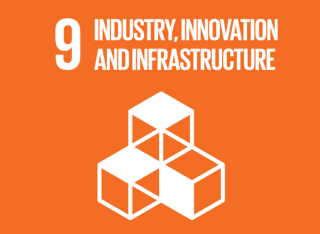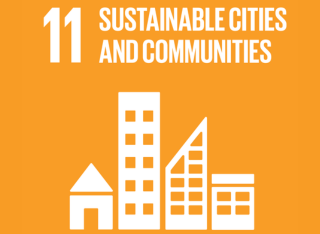
Travel and transport
We are committed to help people work, study and commute in a smarter way in order to secure a sustainable future for the University within Guildford. Flexible working policies, event transport planning and the introduction of sustainable alternatives like pool vehicles and bikes are just a few examples of how we are making this happen.
Key successes
- A range of discounted bus passes are available for staff and students.
- A night bus service for the University and north-west Guildford has been introduced, championed by the student population, Guildford Borough Council and local residents.
- Electric bikes are now on campus and across Guildford to encourage sustainable travel not only between our campuses, but also within the local area. A 25% student discount is available to ensure the scheme is accessible.
- Bike storage facilities are available for staff and students to utilise on Stag Hill campus, Manor Park campus, Hazel Farm campus and the Surrey Research Park.
- All staff have access to an electric vehicle salary sacrifice scheme, as well as a cycle to work scheme.
- Electric vehicle charging units have been installed on Stag Hill campus, with a discounted charging rate available for staff and students.
- New developments on campus have created an additional 350 jobs while the proportion of staff who drive has remained broadly consistent between 42 and 48 per cent.
Embracing greener travel and transport solutions
Find out about our work we are doing and the benefits of choosing sustainable transport.
Travel Plan 2025
The Travel Plan (docx) sets necessary objectives, measures and targets we're aiming to meet.
Main objectives include:
- Creating a cost neutral operation that meets all legal requirements
- Encouraging a shift in mode of transport
- Engendering personal responsibility
- Working in partnership with others
- Ensuring a smooth operation
- Providing the best transport experience.
Pedestrian Priority on Campus
Campus design and features:
- Perimeter road: The main Stag Hill campus is designed with a perimeter roadway that directs traffic around the site, providing primary access to car parks. This design keeps the central parts of the campus safer and more pleasant for pedestrians. Walking routes to and through the Manor Park campus are easily accessible, with vehicle traffic routed away from pedestrian areas.
- Internal paths: Inside the campus perimeter, pedestrians can use a network of footpaths. The university also maintains permissive footpaths and bridleways through its managed woodlands, making it possible to walk to areas like Wood Street without using the main roads.
- Partnership with AccessAble: The university collaborates with AccessAble to provide detailed guides for staff, students, and visitors to help them navigate the campus, including information on accessibility.
- Green spaces: The campus features extensive green spaces and a park with a pond, contributing to a pleasant walking environment.
Sustainable Travel Programs:
The university actively promotes sustainable and pedestrian-friendly travel through programs managed by its Transport Team.
- E-bike scheme: In partnership with the company Beryl, the university offers a campus-based e-bike rental service that links the Stag Hill and Manor Park campuses with the Guildford town centre.
- Discounted bus travel: The university works with the local bus company, Stagecoach, to offer discounted bus passes for travel between campuses and around the local area.
Rules for vehicles on campus:
The university has specific rules to ensure the safety of pedestrians and other road users on its grounds.
- Drivers on campus must pay particular attention to pedestrians and cyclists and adhere to national road traffic regulations.
- Vehicles should be maneuvered with care, and certain walkways may be designated as pedestrian zones.
Travel Survey and Travel Audit 2025
During Sustainability Week in April 2025, the University ran a travel survey for all staff and students with the aim of updating information on travel modes for both groups. This will then form the basis of a revision of the University’s Travel Plan, reviewing objectives and actions for the coming 5 years. Actions continue for the existing travel plan, such as beryl bikes, electric vehicle charging and supporting public transport options. Once the travel survey has been fully analysed, further information will be updated on the sustainability website.
Preliminary findings of the 2025 Travel Survey and Audit include:
- 84% of staff work from home for part of the week. Only 15% are unable to work from home.
- Though 60% of staff and students travel to campus by car, they do not do this exclusively. Some days they walked (36%), cycled (8%) or came by train (30%), noting that staff and students are multi-module.
- In a typical week though, the split of travelling by car to other modes of travel like bus, train and bike was generally 50:50.
Further information can be found in the survey and audit report.
Travel to Work and Remote Working Survey 2020
In June, the Sustainability, HR and Surrey Living Lab teams conducted a staff survey to establish whether Covid-19 has changed employee opinions regarding remote working and travel to work. Over 1,200 staff took the survey. Key findings included:
- Seven out of ten respondents said that they had rarely or never worked remotely before Covid-19
- Most respondents commented that remote working had been better than expected, and that they were more productive, less distracted, and better at workload management when working remotely
- Eight out of ten respondents said that they would like to work remotely more frequently, even after they are allowed back to work on campus
- It seems unlikely that commuting behaviours are going to change significantly after Covid-19. Rather than changing travel mode, it seems that most staff would like to commute less in general and work remotely more frequently, in the short and long-term future.
Shaped by the data from this study, HR are developing new working policies and working collaboratively with the Sustainability and Surrey Living Lab teams to try to enhance potential co-benefits, such as improved staff wellbeing, cleaner air and a reduction in carbon emissions from transport.
Read the full survey summary report (PDF).
Sustainable Development Goals
Many of the UN Sustainable Development Goals are actioned through our work on sustainable travel and transport.




